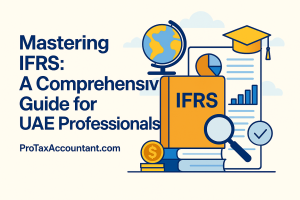Starting a business in Dubai can feel like stepping into a treasure trove of opportunities, but with great rewards come significant challenges.
One of the most critical aspects of running a successful startup is navigating the complex world of taxes.
Many entrepreneurs underestimate the importance of having a corporate tax accountant, often believing they can manage their finances without professional help. However, this oversight can lead to costly mistakes.
In fact, failing to comply with tax regulations can result in penalties of up to 50% of the unpaid tax amount, plus interest.
This article will explore why every startup in Dubai needs a corporate tax accountant, detailing the benefits, tax landscape, registration deadlines, penalties, and how to choose the right accountant for your business.
The Importance of a Corporate Tax Accountant
A corporate tax accountant is not just a number cruncher; they are your financial partner in navigating the intricate tax landscape of Dubai. Here are several reasons why hiring a corporate tax accountant is essential for your startup:
Expertise in Local Tax Laws:
The UAE has a unique tax system that can be confusing for newcomers. A corporate tax accountant understands the local laws and regulations, ensuring that your business remains compliant. This expertise can save you from costly penalties and legal issues.
Maximizing Deductions and Credits:
A knowledgeable accountant can help identify eligible tax deductions and credits that you may not be aware of.
For instance, many startups qualify for incentives under the UAE’s economic diversification initiatives, which can significantly reduce your tax burden.
Time Savings:
Managing taxes can be time-consuming, especially for startups that need to focus on growth and operations.
By outsourcing this task to a professional, you can dedicate more time to running your business.
Strategic Financial Planning:
A corporate tax accountant can assist in developing a long-term financial strategy that aligns with your business goals.
This includes tax planning to optimize your cash flow and minimize liabilities.
Audit Support:
In the event of an audit, having a corporate tax accountant on your side can make a significant difference. They can help you prepare the necessary documentation and represent your interests during the audit process.
Understanding the Tax Landscape in Dubai
To appreciate the necessity of a corporate tax accountant, it’s essential to understand the tax landscape in Dubai. Here are some key points:
Corporate Tax:
As of June 2023, the UAE introduced a federal corporate tax of 9% on profits exceeding AED 375,000. This new tax regime aims to diversify the economy and reduce dependence on oil revenues.
Value Added Tax (VAT):
The UAE implemented VAT at a rate of 5% in January 2018. Businesses must register for VAT if their taxable supplies exceed AED 375,000 annually. Failure to register can result in penalties of up to AED 20,000.
Economic Substance Regulations (ESR):
Companies engaged in certain activities must demonstrate substantial economic presence in the UAE. This includes maintaining adequate employees, premises, and operating expenditures. Non-compliance can lead to fines of up to AED 50,000.
Penalties for Non-Compliance:
The penalties for failing to comply with tax regulations can be severe. For example, the Federal Tax Authority (FTA) can impose fines ranging from AED 1,000 to AED 50,000 for various violations, including late registration and failure to submit tax returns.
Corporate Tax Registration Deadlines
Understanding the registration deadlines for corporate tax is crucial for startups in Dubai. Here are the key deadlines you need to be aware of:
Initial Registration:
All businesses must register for corporate tax within 3 months from the end of their first financial year. For instance, if your financial year ends on December 31, you must register by March 31 of the following year.
Tax Return Submission:
After registration, businesses are required to submit their corporate tax returns within 9 months from the end of their financial year. This means if your financial year ends on December 31, your tax return is due by September 30 of the following year.
Payment of Tax Due:
Any tax owed must be paid at the time of filing the tax return. Late payments can incur additional penalties, which can add up quickly.
Who Needs to Register for Corporate Tax?
Not every business in Dubai is required to register for corporate tax. Here’s a breakdown of who needs to register:
Businesses with Profits Exceeding AED 375,000:
Any business whose profits exceed AED 375,000 in a financial year is required to register for corporate tax.
Foreign Companies:
Foreign companies with a permanent establishment in the UAE must also register for corporate tax, regardless of their profit levels.
Free Zone Companies:
Companies operating in free zones that do not qualify for tax exemptions must register for corporate tax if their profits exceed the threshold.
For more detailed information on who needs to register, visit the Federal Tax Authority.
Understanding VAT in Dubai
Value Added Tax (VAT) is a significant aspect of the tax system in the UAE. Here’s what you need to know:
VAT Rate:
The standard VAT rate in the UAE is 5%. This applies to most goods and services, making it essential for businesses to understand how VAT affects their pricing and cash flow.
VAT Registration Threshold:
Businesses must register for VAT if their taxable supplies exceed AED 375,000 annually. If your business’s taxable supplies are below this threshold, you can still register voluntarily.
VAT Filing and Payment:
Registered businesses must file VAT returns quarterly or annually, depending on their turnover. VAT returns must be submitted within 28 days after the end of the tax period. Late submissions can result in penalties of up to AED 20,000 for first-time offenders.
Input Tax Recovery:
Businesses can recover the VAT they pay on purchases (input tax) if they are registered for VAT. This means that if you buy goods or services for your business, you can claim back the VAT you paid, reducing your overall tax burden.
For more information on VAT regulations, visit the Federal Tax Authority VAT page.
Understanding Economic Substance Regulations (ESR)
The Economic Substance Regulations (ESR) were introduced to ensure that entities engaged in specific activities have substantial economic presence in the UAE. Here’s what you need to know:
Who Needs to Comply:
The ESR applies to entities that conduct specific activities, such as banking, insurance, investment fund management, lease-finance, headquarters, shipping, holding company, and intellectual property. If your business is involved in any of these activities, you must comply with ESR requirements.
Substantial Economic Presence:
To demonstrate substantial economic presence, businesses must meet certain criteria, including having an adequate number of qualified employees, incurring adequate operating expenditures, and having physical offices in the UAE.
Reporting Requirements:
Entities subject to ESR must submit an Economic Substance Report annually. This report outlines the activities conducted, the income generated, and the expenses incurred in the UAE. Failure to comply can result in fines ranging from AED 10,000 to AED 50,000.
For more detailed information on ESR, visit the Ministry of Finance.
Choosing the Right Corporate Tax Accountant
Selecting the right corporate tax accountant is crucial for your startup’s success. Here are some tips to help you make an informed decision:
Look for Relevant Experience:
Choose an accountant with experience working with startups in Dubai. They should understand the unique challenges and opportunities that new businesses face.
Check Qualifications and Certifications:
Ensure that the accountant holds relevant qualifications, such as a CPA (Certified Public Accountant) or ACCA (Association of Chartered Certified Accountants). These certifications indicate a high level of expertise.
Ask for Client References:
Request references from other startups they have worked with. This can provide insight into their reliability and effectiveness.
Evaluate Communication Skills:
Your accountant should be able to explain complex tax concepts in simple terms. Good communication is essential for a successful working relationship.
Assess Their Technology Use:
In today’s digital age, accountants should leverage technology for efficient tax management. Look for firms that use modern accounting software and tools.
Statistics also support the value of hiring a corporate tax accountant. According to a survey by Accounting Today, businesses that engage professional accountants save an average of 20% on their tax bills compared to those who manage their taxes independently.
Conclusion
In conclusion, hiring a corporate tax accountant is not just an expense; it is an investment in your startup’s future.
With the complexities of the tax landscape in Dubai, having a knowledgeable professional by your side can save you money, time, and stress. From maximizing deductions to ensuring compliance, a corporate tax accountant plays a vital role in your business’s success.
If you are a startup in Dubai, consider reaching out to a qualified corporate tax accountant today.
The peace of mind and financial benefits they provide can be the key to unlocking your business’s full potential.
For more insights on business setup and tax regulations in Dubai, visit Grow Biz Quick.





